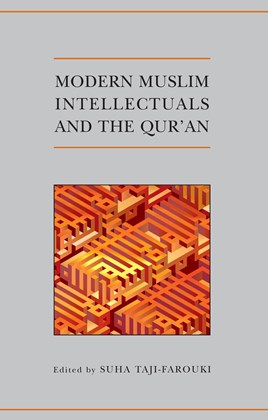Modern Muslim Intellectuals and the Qur’an
Oxford University Press in association with the Institute of Ismaili Studies
This volume examines the writings of ten Muslim intellectuals, working throughout the Muslim world and the West, who employ contemporary critical methods to understand the Qur’an. Their work points to the emergence of a new trend in Muslim interpretation, characterised by direct engagement with the Word of God while embracing intellectual modernity in an increasingly globalised context. The volume situates and evaluates their thought, and assesses responses to it among Muslim and non-Muslim audiences. The ten chapters highlight the diverse arenas in which such intellectuals draw on the Qur’anic text, through their fresh readings of its verses.
Notes on Contributors
1. Introduction
Suha Taji-Farouki
2. Fazlur Rahman: a framework for interpreting the ethico-legal content of the Qur’an
Abdullah Saeed
3. Nurcholish Madjid and the interpretation of the Qur’an: religious pluralism and tolerance
Anthony H. Johns and Abdullah Saeed
4. Amina Wadud’s hermeneutics of the Qur’an: women rereading sacred texts
Asma Barlas
5. Mohammed Arkoun: towards a radical rethinking of Islamic thought
Ursula Günther
6. From revelation to interpretation: Nasr Hamid Abu Zayd and the literary study of the Qur’an
Navid Kermani
7. Post-revolutionary Islamic modernity in Iran: the inter-subjective hermeneutics of Mohamad Mojtahed Shabestari
Farzin Vahdat
8. Mohamed Talbi on understanding the Qur’an
Ronald L. Nettler
9. Hüseyin Atay’s approach to understanding the Qur’an
Osman Taştan
10. ‘The form is permanent, but the content moves’: The Qur’anic text and its interpretation(s) in Mohamed Shahrour’s al-Kitab wal-Qur’an
Andreas Christmann
11. Modern intellectuals, Islam, and the Qur’an: the example of Sadiq Nayhum
Suha Taji-Farouki
Index
‘This well-researched volume is an important original source for all who are interested in the role of religion, especially that of Islam and its re-interpretations, in the now globalised world. It is also of broader value for students of comparative religion, hermeneutics, Biblical studies, philosophy of history, and topics such as relativism and post-modernism.’
– Ahmad S. Moussalli, American University of Beirut
‘This collection of critical studies of modernist and post-modernist interpreters of the Qur’an fills a lacuna in English-language materials on these diverse contemporary Muslim thinkers who are taking highly individualistic, often innovative, and generally controversial approaches to Islam and the Qur’an. A most interesting and useful anthology of studies, it offers relatively easy access to the main themes in the thinking of a diverse selection of Muslim intellectuals around the globe.’
– William A. Graham, Harvard University
Suha Taji-Farouki is Lecturer in Modern Islam, Institute of Arab and Islamic Studies, University of Exeter, and Research Associate, Department of Academic Research and Publications, The Institute of Ismaili Studies. Her publications include A Fundamental Quest: Hizb al-Tahrir and the Search for the Islamic Caliphate (1996); Muslim–Jewish Encounters: Intellectual Traditions and Modern Politics (co-edited, 1998); and Islamic Thought in the Twentieth Century (co-edited, 2004).

